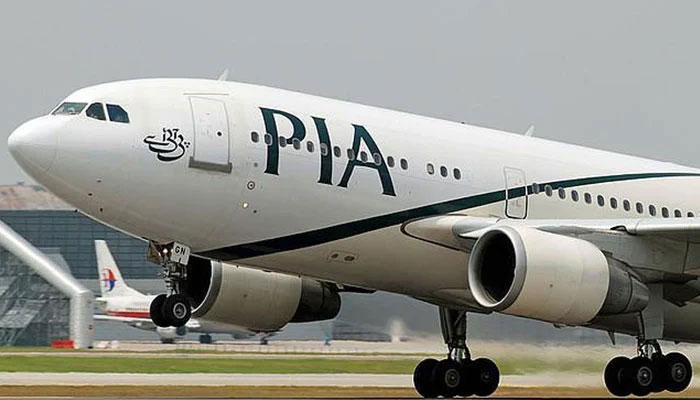Cleared for takeoff
Recent bidding attempt reveals glaring lack of investor interest, as sole bidder offers fraction of minimum price
After nearly four years of turbulence, Pakistan International Airlines (PIA) is finally set to soar in European skies once again. Defence Minister Khawaja Asif announced the lifting of the European Union Aviation Safety Agency (EASA) ban on PIA flights, a move that marks a significant turning point for the struggling national carrier. The accompanying approval of Third Country Operators (TCO) authorisation for another Pakistani airline further sweetens the deal, bolstering Pakistan’s aviation sector at a time when good news has been in scarce supply. The PML-N government has rightly taken credit for this breakthrough, which experts say could substantially improve PIA’s financial prospects, particularly as the government seeks to privatise the loss-making carrier. This development couldn’t come at a better time. A recent failed bidding attempt for PIA revealed a glaring lack of investor interest, with the sole bidder offering a mere fraction of the approved minimum price. With the restoration of lucrative international routes, PIA’s appeal to investors is likely to grow, offering a glimmer of hope for its beleaguered future.
The lifting of the ban, however, also serves as a sobering reminder of how recklessness at the highest levels of government can result in devastating consequences. The roots of this saga trace back to PTI-era aviation minister Ghulam Sarwar Khan’s 2020 statement claiming that 262 out of 860 active Pakistani pilots held ‘fake’ licences. Although he later retracted and rephrased this assertion, the damage was done. The statement not only shook global confidence in Pakistan’s aviation standards but also led to a cascade of bans on Pakistani airlines, with EASA citing concerns about compliance with international safety standards. The financial toll on PIA was enormous, reportedly exceeding a billion dollars, further weakening a carrier already teetering on the edge. The repercussions of Sarwar’s unverified claims offer a critical lesson in governance: words have consequences. In the realm of international aviation – where safety and trust are paramount – irresponsible statements can carry staggering costs. That a minister propagated factually incorrect information on such a sensitive matter, leading to global embarrassment and financial ruin, is an indictment of not just individual recklessness but systemic failures in accountability.
Despite the catastrophic fallout, neither Sarwar nor the PTI government faced meaningful accountability for this debacle. This lack of repercussions underscores a broader malaise in Pakistan’s political culture, where mismanagement and negligence are often forgotten rather than addressed. For a country grappling with a litany of crises, from economic instability to political chaos, the absence of accountability sets a dangerous precedent. The government must ensure that this second chance for PIA is not squandered. Efforts to privatise the airline should be conducted with transparency, realism, and due diligence to avoid another embarrassment like the previous failed auction. Simultaneously, reforms to improve PIA’s operational efficiency and customer service are essential to restoring its tarnished reputation. The lifting of the EASA ban is a moment of cautious optimism – a sign that recovery is possible even after a significant misstep. However, it is also a stark reminder of the stakes involved when those in power play fast and loose with facts. As PIA prepares to spread its wings over Europe, Pakistan must ensure that its aviation sector is guided not by political hyperbole but by a steadfast commitment to professionalism, accountability, and truth.
-
 Kanye West's Best Songs: Fans Argue Over Bold Top 10 Ranking On Social Media
Kanye West's Best Songs: Fans Argue Over Bold Top 10 Ranking On Social Media -
 King Charles Secretly Relies On Advice From THIS Royal
King Charles Secretly Relies On Advice From THIS Royal -
 Jennifer Garner Reveals Beauty Choice She Makes As Botox Alternative In Her 50s
Jennifer Garner Reveals Beauty Choice She Makes As Botox Alternative In Her 50s -
 Kate Middleton Drops Four-word Message For Young Girl After Wales Visit
Kate Middleton Drops Four-word Message For Young Girl After Wales Visit -
 Shamed Andrew Uncensored ‘massages’ Should Be Refunded To Public
Shamed Andrew Uncensored ‘massages’ Should Be Refunded To Public -
 Kylie Kelce Reveals Rules She Wants Daughter Bennett To Learn At 3: No More 'passies'
Kylie Kelce Reveals Rules She Wants Daughter Bennett To Learn At 3: No More 'passies' -
 Smartphone Market Set For Biggest-ever Decline In 2026
Smartphone Market Set For Biggest-ever Decline In 2026 -
 Mud, Rain, Loincloths: All About Japan’s 200-year-old Harvest Wrestling Ritual
Mud, Rain, Loincloths: All About Japan’s 200-year-old Harvest Wrestling Ritual -
 Jonathan Majors Set To Make Explosive Comeback To Acting After 2023 Conviction
Jonathan Majors Set To Make Explosive Comeback To Acting After 2023 Conviction -
 Next James Bond: Why Jacob Elordi May Never Get 007 Role?
Next James Bond: Why Jacob Elordi May Never Get 007 Role? -
 Maddox Drops Pitt From Surname In Credits Of Angelina Jolie’s New Film 'Couture' Despite Truce From Father's End In Legal Battle
Maddox Drops Pitt From Surname In Credits Of Angelina Jolie’s New Film 'Couture' Despite Truce From Father's End In Legal Battle -
 Meghan Markle Adds Diamonds To Engagement Ring For Jordan Trip
Meghan Markle Adds Diamonds To Engagement Ring For Jordan Trip -
 Burger King Launches AI Chatbot To Track Employee Politeness
Burger King Launches AI Chatbot To Track Employee Politeness -
 Andrew’s Woes Amid King Charles’ Cancer Battle Triggers Harry Into Action For ‘stiff Upper Lip’ Type Dad
Andrew’s Woes Amid King Charles’ Cancer Battle Triggers Harry Into Action For ‘stiff Upper Lip’ Type Dad -
 Experts Warn Andrew’s Legal Troubles In UK Could Be Far From Over
Experts Warn Andrew’s Legal Troubles In UK Could Be Far From Over -
 Teyana Taylor Reflects On Dreams Turning Into Reality Amid Major Score
Teyana Taylor Reflects On Dreams Turning Into Reality Amid Major Score




